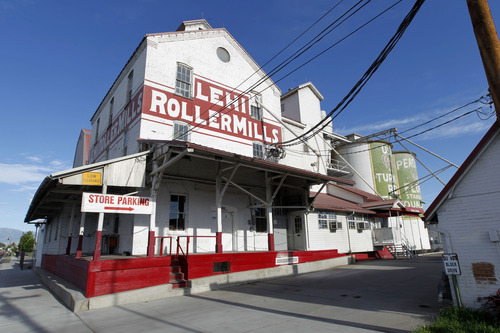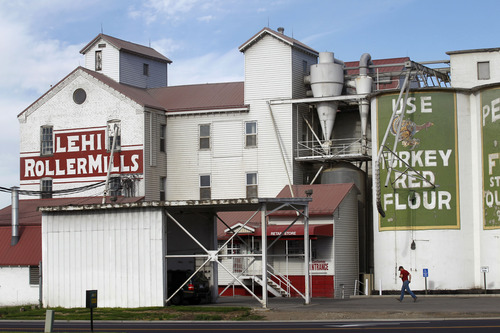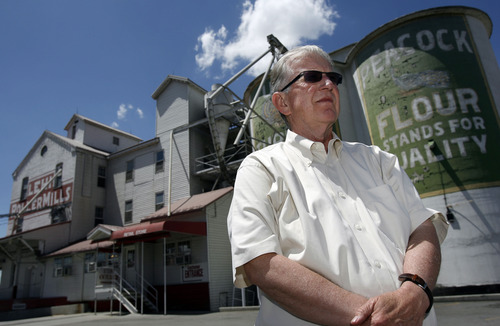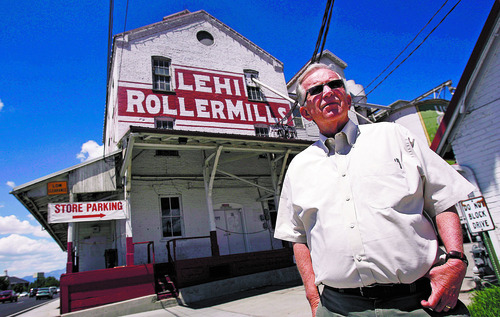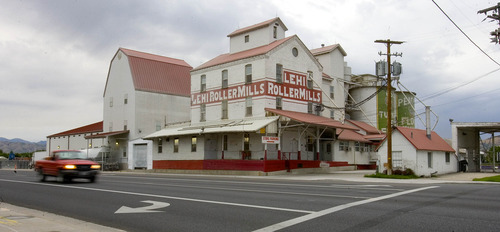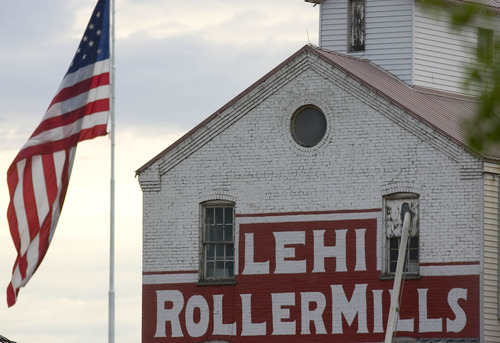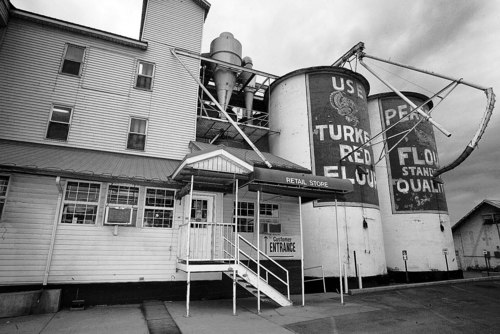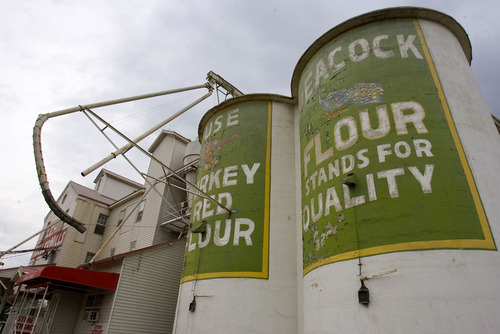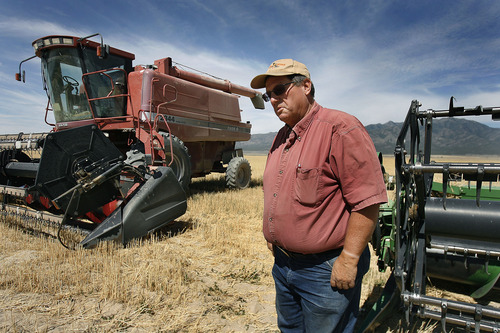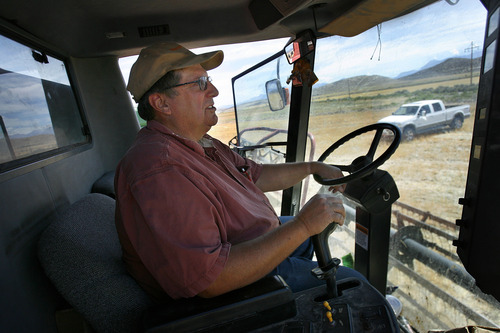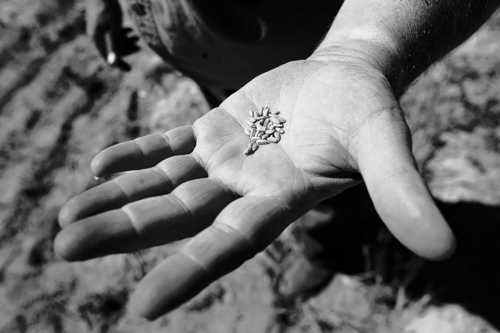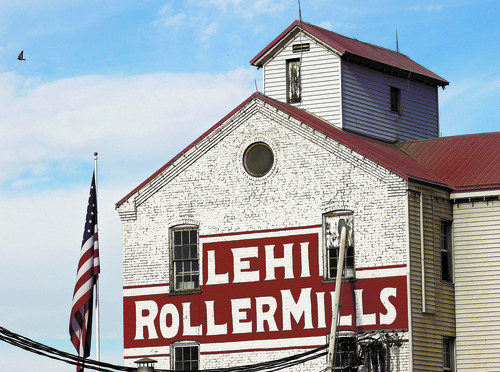This is an archived article that was published on sltrib.com in 2012, and information in the article may be outdated. It is provided only for personal research purposes and may not be reprinted.
Lehi • A Utah flour mill whose distinctive architecture made it an icon in art and film has made news in recent weeks for being enveloped in a financial mess that's imperiling its future.
What is only now emerging is that the 107-year-old business also is caught up in a web of bureaucratic entanglements that has fueled its troubles, the details of which are growing more perplexing by the day.
The latest dustup came after the U.S. Department of Labor sent letters earlier this month to customers of Lehi Roller Mills, telling them to "voluntarily" refuse any shipments of flour and bakery goods. The action apparently was in response to several workers taking to the streets in early July to protest that they and others had missed several paychecks.
The Labor Department made its move July 20 by filing a complaint in U.S. District Court for Utah seeking to force the Roller Mills to stop all shipments. The agency also sent letters to customers, telling them that if they accepted shipments from the Mills, they could be in violation of federal law. That was the same day the owner says he promised investigators that all 38 workers would be paid back wages. On Thursday, federal officials withdraw the motion — saying that the Mills had provided proof on Wednesday and Thursday that the workers had been paid.
But by then, Roller Mills' owner Sherman Robinson said, the damage had been done.
"I've already gotten calls from my customers," he said. "One said I must have done something terrible to get that letter."
Los Angeles labor attorney Jesse Atilano, who has worked on similar cases but is not involved with the Roller Mills issue, questioned the agency's tactics. He argues that for the Labor Department to notify customers to refuse shipments prior to going before a judge not only is a violation of due process but also typically results in forcing businesses into bankruptcy — leaving all employees out of a job.
"It may make sense to do that with a bad employer or a repeat offender," he said. "But there may be a better way to get employees their money. If wages are due, the department could sit down and work out a solution, but they're not doing that."
Labor Department spokeswoman Elizabeth Todd, who said she could not discuss the case directly, referred only to the agency's website, which says it may seek to suspend shipments when an employer does not "voluntarily" correct wage, overtime or child labor violations.
Were that the beginning and the end of Roller Mills' troubles, Robinson might find peace, but there's so much more to the Roller Mills saga.
Through thick, thin • Robinson actually traces many of his financial difficulties to yet another federal agency, the U.S. Department of Agriculture, whose stated mission is to help farmers and agricultural businesses.
For years, the USDA has refused to disclose whether it has completed a wide-ranging investigation into one of Roller Mills' customers, dating to nearly a decade ago. Even as the probe has ensued, the USDA had guaranteed a loan to Lehi Roller Mills, which Robinson said no bank would touch, in part because he had to disclose on financial applications that he also was under investigation for reasons that have never been made clear to him.
"You have no idea how much damage my government has done to this business and to the families of our employees," said Robinson, 64. "I rightfully expected more of those who represent our government, and who take an oath."
Robinson thought he put the investigation behind him when he secured a line of credit through America West Bank, based in Layton. But in 2009, regulators closed the bank and appointed the Federal Deposit Insurance Corp. as receiver. The action not only cut off the Roller Mills' line of credit. But it also froze liens the bank held against the property — leaving Robinson with no collateral to obtain a loan elsewhere.
"This can be a real complication for businesses when a bank fails," said George Sutton, an attorney and former commissioner of Utah Department of Financial Institutions. "You need collateral to get a new line of credit, but when the first bank fails, it still has a lien on your buildings, equipment and receivables. If you have to set up a new line of credit, your collateral is tied up with the failed bank."
Robinson is making do with a purchase-order loan at an interest rate of 35 percent that is wiping out profits and eating up his cash. With so-called asset financing — often called Pay Day lending for businesses — he can obtain working capital only for orders already sold. The arrangement means Internet sales have been discontinued and that Robinson has no inventory on hand to fill orders quickly.
Sales have plummeted from $18 million in 2006 to about $10 million today.
Despite Roller Mills' financial troubles, some are sticking by Robinson.
Jim Smith, 55, who farms 7,000 acres in Cedar Valley on the west side of Utah County, acknowledges that he's holding an unpaid note, "but I won't say how much because some people might think I'm stupid and others might say it's nothing to talk about. He's paid me for every kernel of wheat for the past two years, and he's an honest man. I trust him. I absolutely do."
Smith still has a check made out to his grandfather, Earl Smith, from Robinson's grandfather, George Robinson, dated 1916.
"For this local farm economy, Roller Mills has been an almost incalculable asset," said Smith. "Our feeling is if we can hunker down with him, we'll get through this together, we'll be here hopefully for more generations to come."
A tough go • Other customers have not been so understanding and have dropped Roller Mills, including WinCo, Walmart, Costco and Winn-Dixie Stores because of delayed or unfilled orders. Yet so far, Associated Food Stores, a cooperative of 400 independent grocers that includes Harmons, has remained steadfast.
"Lehi Roller Mills has been a provider of organic flour for Harmons' artisan breads, and we hope they can find their way through this unfortunate set of circumstances," said Lori McFarland, Harmons vice president of sales.
The mill, once a backdrop in the movie "Footloose" and a favorite among photographers and artists, annually produces about 100,000 pounds of flour for wholesale and bakery mixes.
Robinson and wife Barbara developed the mixes in the 1990s, allowing home cooks to whip up pancakes, muffins, brownies, cookies, cakes and bread. The move was one of many reinventions of the mill over the years. In the 1950s, Robinson's late father, Sherm, was one of the first to extend credit to Peter Harman, who teamed up with Colonel Harland Sanders to open the nation's first Kentucky Fried Chicken outlet in Salt Lake City.
Lehi Roller Mills still makes the corn bread mix and chicken coating for Harman's franchises in the western United States.
That kind of a track record should have made it possible for Lehi Roller Mills to get a loan, even after the America West failure, said commercial loan officer Eric Wadley, who worked with Robinson in an unsuccessful effort to get other financing.
"Nobody wanted to deal with a century-old flour mill — it was just too complicated," said Wadley. "What banks want is a nice clean transaction, say a dentist in business for 20 years who wants to buy a building for his practice."
And now the window of opportunity for a USDA-backed loan has closed because the agency is accepting applications only from rural businesses, and Lehi is considered an urbanized area. Robinson could apply for an exemption, but first he has to find a lender.
Under suspicion • So far, only venture capitalists are interested in financing Roller Mills. Robinson also isn't willing to go into a structured bankruptcy, which would force him to pay pennies on the dollar he owes to his longtime suppliers, vendors and farmers.
"It's a point of pride," said Robinson. "I don't want to be the one who doesn't pay in full what's owed. I don't even want to think about what would happen to the people who have stuck with me all these years. I don't want that to happen on my watch."
Robinson's issues with the USDA took root in 2003, when the mill was mixing and bagging nonfat dry milk for an Ogden firm, R&J Feed Co. Partners in the feed company, Jerry Goodwin and Richard Carter, were subsequently named in a USDA civil suit for alledgedly falsifying records so they could export nonfat dry milk, which the government had intended be shipped only to drought-stricken ranchers in the West as animal feed. Among other charges, the government alleges that nearly 8 million pounds of the product were shipped from the R&J warehouse to the Netherlands, Estonia, Germany and the Philippines.
In July, Missouri federal Judge Gary Fenner refused to dismiss the case, saying the beneficiaries of the government program should have been "cattle producers. The facts, however, indicate R&J Feed was a feed dealer, not a cattle producer."
Robinson had answered questions in the case, and no civil or criminal charges were filed against him. But he said he was eventually notified he also had fallen under suspicion for reasons that were never made clear. In 2007, he enlisted then-Gov. Jon Huntsman Jr. to help sort out which agency might be investigating him — the USDA, Office of Inspector General, FBI or the Justice Department.
Huntsman asked USDA Inspector General Phyllis Fong to look into conduct of USDA employees involved in the investigation — while describing the runaround his own legal counsel got when trying to gather information on behalf of Roller Mills.
The governor's legal counsel "started with a call to the USDA Secretary's Office," Huntsman wrote to Fong. "They would not put her call through to the Secretary or his assistant. They transferred her to another office lower in the agency, which transferred her to another lower office, and then another lower office until she was finally told by the last office that the department had no information to give her."
Fong replied there was no substantiative evidence of government misconduct, and directed the governor to the U.S. Attorney for Utah,"which has legal oversight for prosecutorial determinations."
Robinson's attorney, Sterling Brennan, did just that. He said in a letter he was told that Roller Mills was not under investigation. But when he wrote to the U.S. Attorney for Missouri, where charges originated against R&J Feed, the office responded that "neither the USDA nor the Department of Justice has foreclosed any of the options that it may have with regard to your clients."
A lifeline • Another drain on the company, said Robinson, has been an age-discrimination lawsuit by the Equal Employment Opportunity Commission involving a 49-year-old former plant manager who was terminated in 2003. The lawsuit was filed in 2008 and is pending, meaning Roller Mills is racking up legal fees.
"The regulatory environment has not been helpful to Lehi Roller Mills, and the government has not been helpful. It's been a hindrance," said Brennan. "It's very sad to see what the government has done to this company."
However, there may be some hope.
In March, Brennan won a $4.5 million judgment for Robinson against California-based export company Cal-Agrex Inc. for unpaid bills related to nonfat dry milk that Cal-Agrex allegedly shipped to the Philippines in 2006. A spokesman for Cal-Agrex declined comment.
In looking at Cal-Agrex's actions, Utah federal Judge Ted Stewart noted that Robinson did not participate in the government commodity program, and was told in a letter that the "USDA has no jurisdiction in the ultimate use of the nonfat dry milk" when the Roller Mills alerted the Agriculture Department that the plant would be processing and selling the product.
Now, Robinson's attorney must collect on the judgment.
"I know the importance of Lehi Roller Mills," said Brennan, whose ancestry goes back to Lehi founder David Evans. "Robinson is a terrific man. I hold out the hope that the mill will survive and one day it will thrive. I hope creditors will be patient, and I expect the mill will be true to its commitments."
Twitter@DawnHouseTrib —
Lehi Roller Mills
Founded • 1905 at its present site, 833 E. Main St., Lehi.
All in the family • In 1910, George Robinson purchased the mill, of which grandson Sherman is the current owner
Products • Wholesale flour, mixes for pancakes, brownies, cookies and muffins sold by grocery chains and others
Retail store hours • 9 a.m. to 6 p.m., Monday through Saturday


